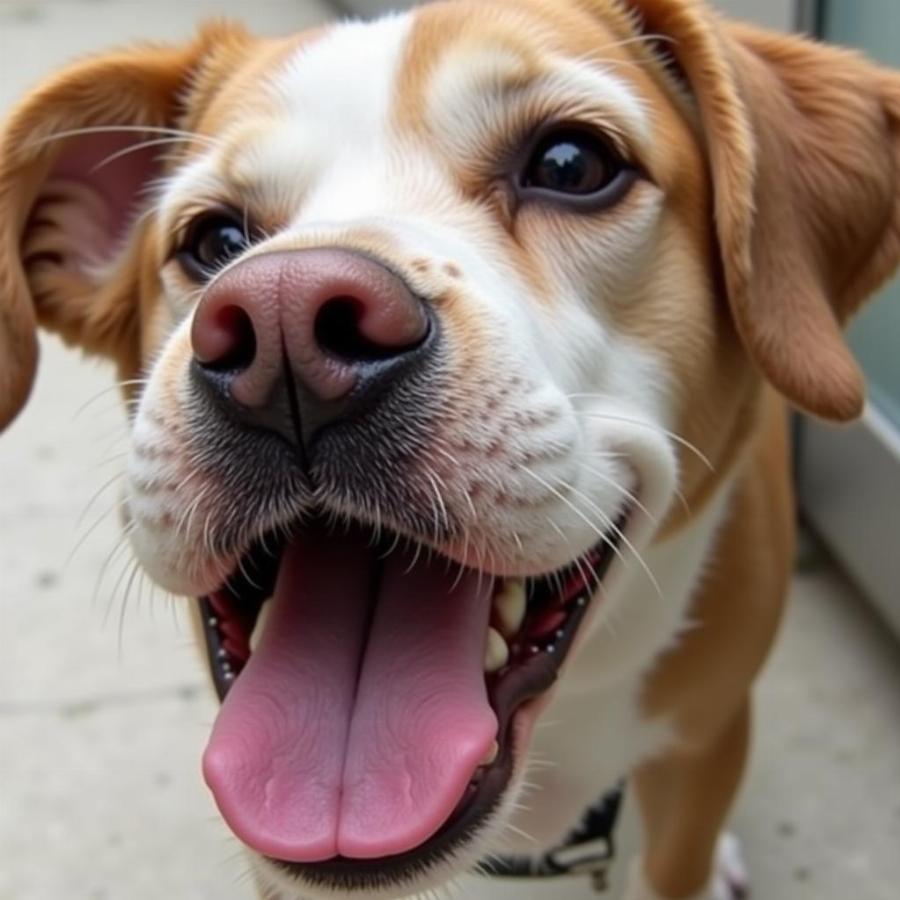Soft palate operation for dogs, also known as staphylectomy, is a surgical procedure performed to correct breathing problems caused by an elongated soft palate. This condition is common in brachycephalic breeds like Bulldogs, French Bulldogs, and Pugs. If your furry friend is snoring excessively, struggling to breathe, or experiencing exercise intolerance, a soft palate operation might be necessary. Understanding this procedure is crucial for providing the best care for your brachycephalic companion.
Understanding Soft Palate Elongation in Dogs
Soft palate elongation occurs when the soft palate, the fleshy tissue at the back of the throat, is too long and obstructs the airway. This can lead to a variety of respiratory issues, impacting your dog’s quality of life. Symptoms range from noisy breathing and snoring to gagging, coughing, and even cyanosis (bluish discoloration of the gums). Early diagnosis and intervention are vital to prevent further complications.
 Soft Palate Elongation in a Dog
Soft Palate Elongation in a Dog
Why a Soft Palate Operation is Sometimes Necessary
When conservative management options, like weight control and limiting strenuous exercise, fail to alleviate breathing difficulties, surgery becomes the best option. A soft palate operation aims to shorten the soft palate and widen the airway, allowing your dog to breathe more comfortably. This procedure is often combined with other airway surgeries, such as nares resection (widening of the nostrils), to maximize improvement.
What Happens During a Soft Palate Operation?
The surgery is performed under general anesthesia. The veterinarian carefully trims and reshapes the elongated soft palate, ensuring that enough tissue remains for normal swallowing function. The goal is to create a clear and unobstructed airway while minimizing the risk of complications.
Post-Operative Care for Your Dog
After the soft palate operation, your dog will need special care and attention. Pain medication and antibiotics will be prescribed to manage discomfort and prevent infection. A soft food diet is recommended for the first few weeks to avoid irritating the surgical site. Regular check-ups with your veterinarian are essential to monitor healing and address any potential complications.
What to Expect After Surgery?
Your dog might experience some swelling and discomfort in the throat after the surgery. Reduced appetite and mild coughing are also common. However, these symptoms should subside gradually as healing progresses. It’s crucial to follow your veterinarian’s instructions carefully to ensure a smooth and successful recovery.
Long-Term Benefits of the Operation
A successful soft palate operation can significantly improve your dog’s quality of life. Breathing becomes easier, snoring is reduced, and exercise tolerance improves. By addressing the underlying cause of respiratory distress, this surgery can help your brachycephalic companion live a healthier and more comfortable life.
Conclusion
Soft palate operation for dogs is a crucial surgical procedure that can significantly improve the respiratory health of brachycephalic breeds. By understanding the procedure, post-operative care, and long-term benefits, you can make informed decisions for your furry friend and ensure their well-being. If your dog is exhibiting signs of respiratory distress, consult with your veterinarian to determine if a soft palate operation is the right solution.
FAQ:
- How long does a soft palate operation take? Typically, the surgery takes about 30-60 minutes.
- Is a soft palate operation painful for dogs? Pain medication is administered to manage discomfort during and after the procedure.
- What are the potential complications of a soft palate operation? Potential complications include bleeding, infection, and swelling.
- How long is the recovery period after a soft palate operation? Most dogs recover fully within 2-3 weeks.
- Can all breathing problems in brachycephalic dogs be solved with a soft palate operation? Sometimes other procedures, like nares resection, are also necessary.
- What is the cost of a soft palate operation for dogs? The cost varies depending on the veterinarian and location but typically ranges from $500 to $1500.
- How can I prevent soft palate elongation in my dog? While it’s difficult to prevent in brachycephalic breeds, maintaining a healthy weight can help reduce the severity.